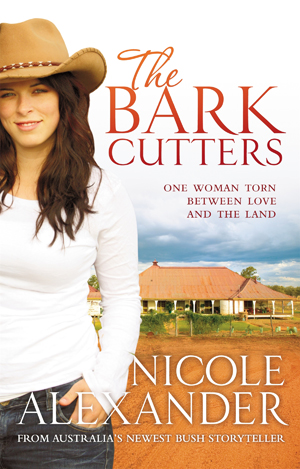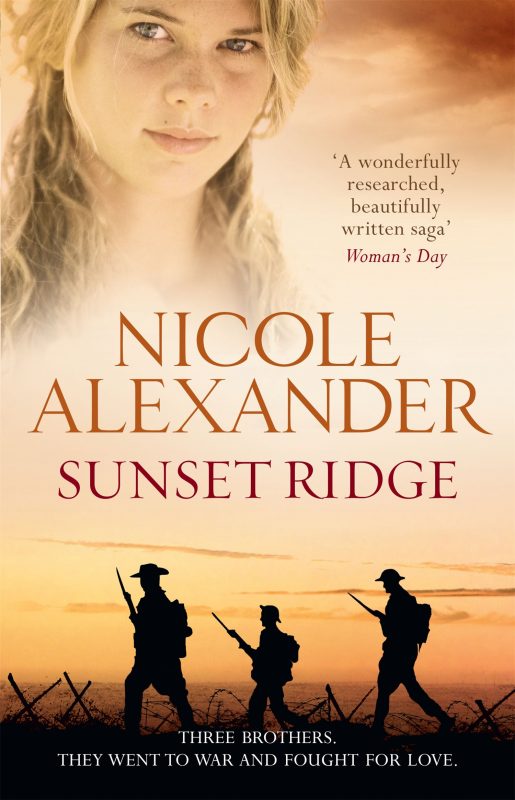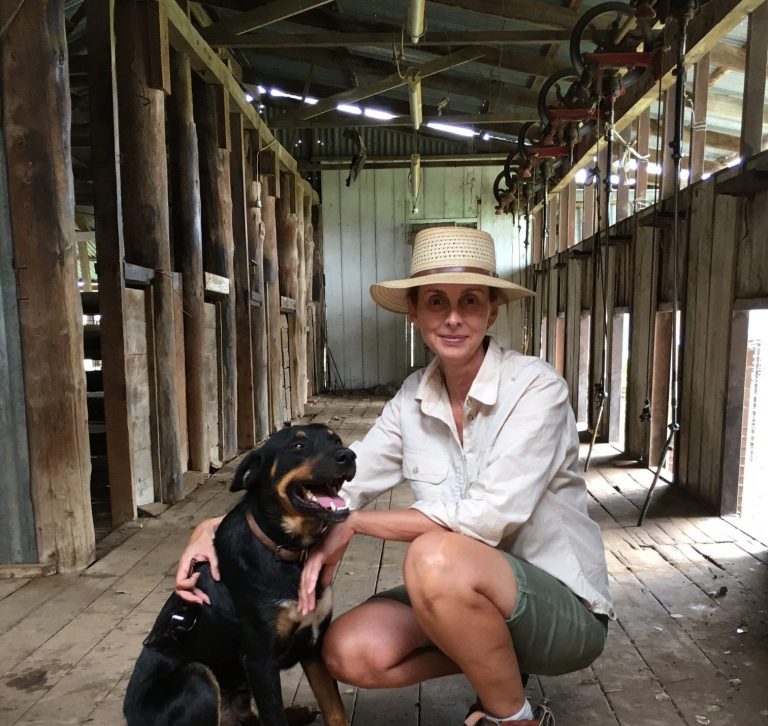Nicole Alexander is one of Australia’s best-known novelists, weaving threads of history, adventure and romance into unique and fascinating stories, appealing to all ages and genders. Raised on a family property near Moree, she has a connection to the land that goes back generations. Some of her books have been based on journal entries from the family archives.
Nicole has written eight bestselling novels. Her first, The Bark Cutters, was shortlisted for an Australian Book Industry Award. In 2012 she was named Barwon Woman of the Year, for services to literature and the promotion of outback Australia. She has featured in national and international magazines, newspapers, radio and television programs including Time International, Studio Ten, Australian Women’s Weekly, ABC Landline and Radio National.
According to Nicole, when her great-grandfather first selected Murki Station in 1893, he chose a site for the homestead near the banks of Whalan Creek, a tributary of the Boomi River. A few days later local Aboriginals approached and told him that the area was subject to heavy flooding. On their advice he selected a new site some miles to the north, on a high ridge. This proved to be good advice, for when Nicole was a child, in the great flood of ’76, water lapped the homestead floorboards for six weeks, but never entered the house. Snakes and centipedes, of course, were another matter.
Nicole grew up on Murki (which was sold in 2016) and her early education included lessons through the mail via the Correspondence School in Sydney. Nicole’s mother taught Nicole and her siblings around the dining room table, as by that stage the old school-house on the property, which still stands, had been converted into extra accommodation for jackeroos.
Like many rural children, Nicole went to boarding school for her secondary education before moving on to university. She spent time in the corporate world in both Sydney and Singapore before deciding to return home in the early 1990s.
Somehow, with farm work keeping her busy from dawn to dusk, Nicole started to fulfil her dream of writing novels. I caught up with Nicole recently and asked her some questions about life as a famer and writer.
Could you please tell us about your ‘day job’ as a farmer?
Our property is located 110 kilometres north-west of Moree, near the village of Boomi, population 75. With the illness and recent passing of my father we downsized in early 2016 to a more manageable two properties.
I no longer live on the property but commute from Moree twice-weekly – more often at the moment as we are feeding livestock with the continuing dry weather. It’s about a 220 kilometre return trip. Our business is a mixed-agricultural property producing Hereford beef, merino wool, white Suffolk fat lambs, and our dry land crop programme included: wheat, barley, oats, sorghum, faba beans and chickpeas. Since the downsizing we have concentrated on our Hereford and Angus Beef breeding programme and we sow fodder crops – oats, barley and sorghum for the livestock.
A typical day’s work for me on the property, in a normal season, includes inspecting livestock, working in the stockyards, checking watering points and cultivations with our agronomist. Bookwork remains a major component. With the drought we are purchasing hay (roughage) and cottonseed (protein) to feed our herd along with mineral supplements.
When did you know that you wanted to be a writer?
In my early teens I read The Old Man and The Sea by Ernest Hemingway. I loved the book and subsequently read a biography about Hemingway’s life. What I didn’t realise until a few years later was that the story of this old man in small boat trying to land a huge fish resonated with my own family story and the struggles of farming life. I’d become intrigued with one of the great themes in literature; man versus nature. It was that novella that inspired me to write.
What books did you enjoy reading as a kid?
Fantasies and adventure. The Lion, the Witch and the Wardrobe was my all-time favourite.
Are there any authors you particularly admire?
Overseas – Hemingway, Michael Ondaatje & Charles Frazier.
Domestic – Tom Keneally, Tim Winton.
How old were you when you started writing seriously?
26
You are obviously inspired by landscape. How do you feel when you think about the land your family has farmed for well over a century?
I have a strong emotional attachment to the land. Knowing that you’re working a business that was built through the generations; that you’re standing on soil where your ancestors have also stood, is an all-encompassing but also humbling feeling.
Can you give me a few sentences about your writing process. How do you go from idea to finished novel?
I read on my chosen subject for quite a few months before I begin writing. An idea needs time to germinate. Then once I’ve decided on a time and place I set up my whiteboard and make character lists and plot a rough outline. I never have an ending in mind. I like to see my characters grow and develop and limiting myself to preconceived choices can make a book’s conclusion too easy to gauge. Once I start writing I research specific details on a need to know basis. I write an initial draft and then just prior to writing the ending I start redrafting again. I might do that process 3-8 times depending on my submission date.
I’m a genre writer meaning that I’m contracted to write Australian based historical stories that are classed as popular fiction.
How many novels have you written and which is your favourite?
My ninth novel will be released next year. I think my first novel, The Bark Cutters, will always mean the most to me. It took me eight years to write, which seems excessive, but I’d just returned home to the country to work and live, was writing articles and poetry during that period and I completed a masters during that time as well. Secondly, being offered that first publishing contract and having the work go to auction in Germany for the rights was a gold moment. I remember sitting up late, getting emails from my agent advising me on the progress of the bids.
You write mainly historical novels, why do you think exploring our history in fiction is important?
Making history accessible is vitally important, particularly when our education system seems to have relegated much of Australian history to the dinosaur era. There is so much more to our history than convicts and the military and so much land that lies beyond the Great Dividing Range. Australia has a vast interior, with great tracts of land opened up by resilient settlers. Not only were these settlers embarking on a new life, starting a new business and learning to live with the difficulties of an isolated frontier; they also had to create homes with raw, locally sourced materials. This idea of cutting a swathe through the bush, of literally carving out a home and a business for yourself and your family is a very compelling image.
A writer needs to steep the work in history so that it’s authentic, ensure the narrative is compelling with strong characters that drive the story onwards. As the creator, hopefully you’re pointing a lens at our wonderful past. I’m a great believer in understanding and learning from the past in order to move forward in the present.
Where do you want to be in ten years’ time? (in a holistic sense)
I’m an outdoors / nature person. I can’t see that changing regardless of whether in the country or by the sea.
Nicole Alexander is published by Penguin Books Australia. You can read more about her books and subscribe to her popular blog at nicolealexander.com.au


By Greg Barron
Main picture: Nicole and Jack in the woolshed.





1 Comment
I must show appreciation to the writer for bailing me out of
such a circumstance. Right after looking out through the world-wide-web and
obtaining principles which are not powerful, I believed my
entire life was done. Existing devoid of the strategies to the difficulties you
have resolved by way of your short article is a critical case, and the ones which may have badly affected
my career if I hadn’t noticed your blog. Your actual mastery and kindness in controlling all the stuff was tremendous.
I am not sure what I would’ve done if I had not discovered such a thing like this.
I can also at this point relish my future. Thank you very much for the skilled and results-oriented
guide. I will not think twice to endorse your site to anybody who requires support about this matter. https://lesallecream.net/